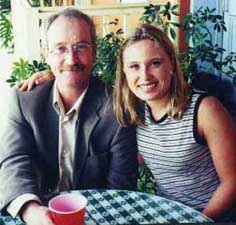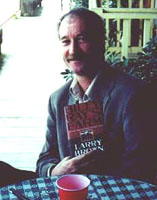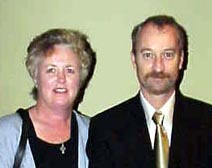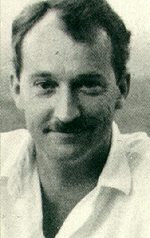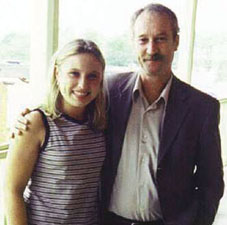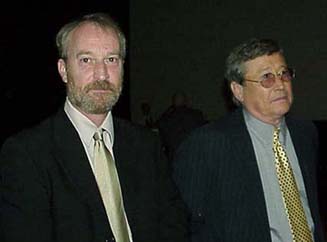Major Works
- A Miracle of Catfish (2007) published posthumously
- The Rabbit Factory (2003) novel
- Billy Ray’s Farm: Essays from a Place Called Tula (2001) non-fiction
- Fay (2000) novel
- Father and Son (1996) novel (Winner of Southern Book Award)
- On Fire (1994) non-fiction
- Joe (1991) novel
- Big Bad Love (1990) short stories, made into film
- Dirty Work (1989) novel
- Facing the Music (1988) short stories
Biography of Larry Brown
by Presley Rose (SHS), 2001, Updated 2015
Larry Brown, a well-known author of short stories and novels, was born in Oxford, Mississippi, on July 9, 1951, to Leona Barlow Brown, a postmaster and store owner and Knox Brown, a sharecropper and World War II veteran. Both of his parents influenced his writings. His mother loved to read and passed down her passion for books to Larry (Thompson 74). The painful stories of W.W.II that were told to Larry by his father are revealed later in his novels Dirty Work and Father and Son (Trosky 88). His father often moved around in search of new jobs and often drank heavily to try to forget the problems suffered in his life (Thompson 74).
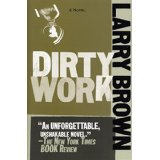 After Larry Brown graduated from high school in 1969, he joined the Marine Corps where he served for two years. There, he devoted many hours listening to countless war stories of disabled veterans just coming back from Vietnam. Those stories helped the author establish the characters in his novel Dirty Work. After his tour of duty, he moved back to Mississippi and worked at several jobs before joining the Oxford Fire Department in 1973, where he worked as a firefighter for sixteen years (Trosky 87). In 1974 Larry married Mary Annie Coleman, who worked as a secretary. It was during those years as a fireman that Brown first experimented with writing. In those early writing days, he was self-taught and strongly influenced by authors that he admired. He wrote story after story, submitting them to various publishing houses and receiving rejection after rejection. Finally, his first story to be published was in “Easyrider” magazine, a magazine for bikers.
After Larry Brown graduated from high school in 1969, he joined the Marine Corps where he served for two years. There, he devoted many hours listening to countless war stories of disabled veterans just coming back from Vietnam. Those stories helped the author establish the characters in his novel Dirty Work. After his tour of duty, he moved back to Mississippi and worked at several jobs before joining the Oxford Fire Department in 1973, where he worked as a firefighter for sixteen years (Trosky 87). In 1974 Larry married Mary Annie Coleman, who worked as a secretary. It was during those years as a fireman that Brown first experimented with writing. In those early writing days, he was self-taught and strongly influenced by authors that he admired. He wrote story after story, submitting them to various publishing houses and receiving rejection after rejection. Finally, his first story to be published was in “Easyrider” magazine, a magazine for bikers.
By 1980 Brown decided to pursue writing as a career. He enrolled in a writing class at The University of Mississippi to polish his skills and to help him find his own literary voice. Mississippi author Ellen Douglas taught the class and was influential in developing his understanding of literature. Brown says, “I read a lot of writers to look at different styles and to try and learn how they did things. From them I learned how to make strong characters, how to move them around and motivate them From his first book, the collection Facing the Music, published in 1988, Brown has been true to his story-telling depictions of lower- middle-class characters that use destructive means to escape everyday life. His other major works include Dirty Work (1989), Big Bad Love (1990), Joe (1991), On Fire (1994), Father and Son (1996), Fay (2000), Billy Ray’s Farm: Essays from a Place Called Tula (2001) non-fiction, The Rabbit Factory (2003) a novel, and A Miracle of Catfish, published posthumously in 2007. His work Big Bad Love was made into a movie. According to one author, Larry Brown writes about what he knows. He knows about humble dwellings, about alcohol abuse, and about the obstacles that a lower class families deal with. He knows the lessons that are learned through heartache and hard work, and he writes about the simple things in life, the things that can only be taught through experience (Wilson 15).
Larry Brown died of an apparent heart attack on November 24, 2004, at the age of 53 in Tula, Mississippi. The New York Times obituary stated that he was a writer “whose spare stories bluntly conveyed the painful hope of the rural poor.” He won numerous awards for his work, including the Mississippi Institute of Arts and Letters Award for Literature, the Southern Book Critics Circle Award for Fiction in 1992 and 1997, a Lila Wallace-Reader’s Digest Award in 1998, and the 2001 Thomas Wolfe Prize. In all he wrote two short story collections, five novels, and two books of nonfiction.
The 2007 Oxford Conference for the Book in Oxford, Mississippi, was a tribute to the Larry Brown and included presentations on his life and literary legacy and remembrances by friends and editor. A CD tribute to Larry Brown entitled Just One More,was released in 2007 by his musician friends.
Brown’s survivors are his wife Mary Annie Coleman Brown; his children Billy Ray, Shane, and LeAnne, and two grandchildren.
Biography of Larry Brown
By Charles Robinson (SHS) May 2000 Updated 2015
Mississippi is one of the leading states for modern literature. When people are questioned about authors from Mississippi, names that automatically come to mind include Welty, Faulkner, and Grisham. Perhaps it is time to add another child of the South to this ever-growing list of writers. Larry Brown has taken his place in the limelight as a master craftsman of words, using vivid, yet simple language to paint a spectacular picture for his increasing number of readers.
Larry Brown was born in Oxford, Mississippi, on July 9, 1951, to Knox and Leona Brown, a rural farm family. The early years of his life were spent on his parents’ farm; but at the age of three, Brown’s father accepted a position at Fruehauf Trailer Company in Tennessee. Brown’s father moved the family to Memphis. After the eighth grade, Brown’s father then moved the family back to Oxford, Mississippi. During this time Brown’s mother fostered his love for books. Brown says that for as long as he can remember there were always books in the house. In fact, Brown’s first memories of his mother are of her reading (Bonetti).
After moving back to Mississippi, Brown developed a profound sense of the outdoors that is reflected in the descriptions of nature in his books. Preferring to be outside instead of sitting in class, Brown’s grades suffered. Brown has said this about his teenage years, “I wanted to stay in the woods with my gun and hunt every day and half the night sometimes, too”. Needless to say, Brown did not pass all of his classes, including senior English. Instead of repeating his senior year, Brown was forced to go to summer school so that he could get his diploma. Brown blames his failure in this area of his life on the fact that he had no long-range plans for his life. Because the Vietnam conflict was at its height and military service was inevitable, Brown entered the Marines in October of 1970. However, Brown was not sent to Vietnam. At the time he entered the service, troop withdrawals had already begun; so after basic training he was relocated to the Marine Barracks in Philadelphia, Pennsylvania, where he was instructed to undergo dress blues duty (Bonetti).
While in the Marine Corps, Brown met the men on whom he based the characters for his book Dirty Work. Brown says that everyone in the Marine Barracks was a veteran, and the Barracks was rich in history because everyone had their story to tell. From descriptions of the war by the veterans, he developed the flashback scenes described and filled in the rest about the function of weapons and other military activities from his knowledge gained at Boot Camp (Bonetti).
After leaving the service, Brown moved back to Oxford, Mississippi, and joined the fire department where he served for approximately seventeen years (Trotsky 87). However, this number conflicts with some sources who put his years of service at twenty-two (Parsons). Working as a firefighter till 1986, he was then promoted to captain, and he served in that position until 1990 when he resigned to take up writing full time (Trotsky 87). Although Brown left the fire department to start writing in 1990, his career as an author began much earlier. Brown says that in about 1980, he did not feel very accomplished with his life and felt that he needed to do something else. As he had enjoyed reading for most of his life, Brown felt that writing was a logical thing to try, so he set out to write a novel in that year (Skube).
Seventeen months of work later, a draft manuscript had been created, and he sent it off to New York with hopes of having it published. After multiple efforts to convince editors that his work was worthy of their time, he went back to work, unpublished and frustrated. Brown wrote and revised manuscripts and had them returned multiple times until he came to a point where he burned one of his manuscripts out of anger. Eventually though, his work paid off. Seven years after he started writing, a subsidiary of a New York publisher noticed his works (Skube).
Under the direction of Algonquin Book’s editor, Shannon Ravenel, Brown’s work began to came into full bloom. Realizing that this self-made author had a style distinctly his own and a talent matched by few, she was able to help Brown further develop his talent and produce other works that have won great acclaim (Trotsky 90). Brown has won the Southern Book Critics Circle Award for Fiction in 1992 and 1997, and the Mississippi Governor’s Award for fiction (Algonquin Books). Following the release of Father and Son, Algonquin published Joe, a story that Brown had been writing for several years. As an interesting side note, Brown’s novel Joe begins very much in the same way his novel Fay does– with a person walking down a blacktop road in the heat of the Southern summer. However, this is no coincidence as the main character in his book Fay is a minor character in Joe. Fay walks out of the story because she cannot handle the oppression of her family (Trotsky 90).
Brown is also the recipient of the Mississippi Institute of Arts and Letters Award for Literature, the Southern Book Critics Circle Award for Fiction, the University of North Carolina’s Thomas Wolfe Prize, and the Lila Wallace-Reader’s Digest Award. Brown married to Mary Annie Brown, and they have three children. The older son is Billy Ray (see Brown’s book Billy Ray’s Farm). Another son, Shane Michael Brown, graduated from Mississippi State University in Starkville, Mississippi. Their daughter LeAnn lives in New York. Brown resided in Oxford, Mississippi, with his wife Mary Annie. He died in 2004.
Excerpt from The Rough South of Larry Brown – Documentary by Gary Hawkins
Reviews
A Review of Billy Ray’s Farm
by Presley Rose (SHS)
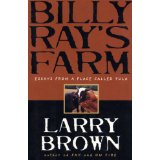 Billy Ray’s Farm is a wonderful autobiographical collection of stories written by Larry Brown. In it he tells the interesting story of one part of his life. With his troublesome predicaments and the crazy events that happen, his world consumes the reader. The book describes the trials and tribulations of a normal, everyday life and especially the problems that come with trying to start a farm.
Billy Ray’s Farm is a wonderful autobiographical collection of stories written by Larry Brown. In it he tells the interesting story of one part of his life. With his troublesome predicaments and the crazy events that happen, his world consumes the reader. The book describes the trials and tribulations of a normal, everyday life and especially the problems that come with trying to start a farm.
The setting is mostly on Billy Ray’s farm in Tula, Mississippi. Brown takes the reader all around the farm. He also introduces his beloved animals. Brown does a terrific job in describing the wonderful nature that permeates the farm. Brown associates with many people throughout the book. A couple of veterinarians help Billy Ray and Larry with a few of their farm troubles. Brown’s family also helps with farm troubles as do his friends. The rest are just some ordinary people that make up the town of Tula.
Brown writes so descriptively in his book that the reader feels like he/she is there. In many cases, Brown describes the problem he has, then tells what he is thinking– whether his thoughts are pleasant or not. The reader can get so consumed by the book that he feels like he is just sitting back and watching Brown as he fixes the predicament. I found myself getting so frustrated or upset and even wanting to put the book down , but then I don’t because I can’t stand not knowing the outcome, good or bad.
I personally enjoyed the book. Usually it is very hard for me to keep interested in a book; but with Brown’s descriptions and the way the words just seem to flow so nicely on the page, it was easy for me to read and enjoy the book. I believe that would be true for almost any reader.
A Review of Fay
By Charles Robinson (SHS)
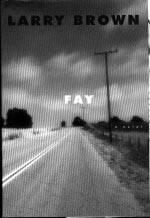 The character Fay in Brown’s novel of the same name can be described as a typical Southern redneck or worse. Reading Fay we soon learn that she has been totally deprived of a modern education. She does not know what a seat belt it, that television exists, or that there are legal limits on purchasing intoxicating goods. Larry Brown’s narrative of Southern life follows this young and naive seventeen year old as she ventures out into the world. Fleeing her life in a abusive family, her story actually goes back to another novel by Brown called Joe, where she walks out of the story down the blacktop. Brown now picks up the story of Fay Jones in his new novel.
The character Fay in Brown’s novel of the same name can be described as a typical Southern redneck or worse. Reading Fay we soon learn that she has been totally deprived of a modern education. She does not know what a seat belt it, that television exists, or that there are legal limits on purchasing intoxicating goods. Larry Brown’s narrative of Southern life follows this young and naive seventeen year old as she ventures out into the world. Fleeing her life in a abusive family, her story actually goes back to another novel by Brown called Joe, where she walks out of the story down the blacktop. Brown now picks up the story of Fay Jones in his new novel.
As Fay flees down the highway, she catches a ride with a group of drunk guys who have just been discharged from the military. Joining them on their trip home from fishing, Fay finds herself heading down a road to a life of shame. Soon she realizes that the hospitality she is receiving will just get her into the same kind of trouble that she was in, so she leaves her new found “friends” and again sets out along the highway.
Fortunately for Fay, her life is about to take a better turn. As she moves in the sweltering heat, a state trooper named Sam Harris tries to help her and picks her up. He has perhaps made one of the worst decisions of his life. After some time, she relays her story to him, how she had come from an abusive family, one so dysfunctional that her father traded her little brother for a truck. Taking sympathy on her, Sam brings Fay home and adopts her into his family as an act of goodwill, but also as an attempt to cover his feelings from a failing marriage and the loss of his only daughter.
Sam and his alcoholic wife Amy develop a particular fondness for Fay. However, when Fay discovers that Sam is secretly seeing another woman, things begin to fall apart. At the onset, these two characters (Fay and Sam’s lover) were at each other’s throat. Divided by a socio-economic rift, they make their feelings known to each other as they both compete for the affection of Sam. Eventually, Amy learns of Sam’s infidelity, and in a drunken depression, kills herself in a car accident.
Leaving the door open for another relationship, Sam has already found dissatisfaction with his lover, and soon turns to Fay, who is also grieving because of Amy’s death. The two enter into a sexual relationship and with the news of a pregnancy, the topic of marriage soon arises. However, before this can be discussed, Fay finds herself the perpetrator of a homicide, and she flees to the coast. Arriving on the Gulf Coast in Mississippi, Fay is taken in by Reena, a waitress/strip dancer, who introduces Fay to Aaron, the bouncer at the club where Reena works. Aaron, whose mother runs a bed and breakfast in Pass Christian, Mississippi, brings Fay home where another relationship soon develops. Unfortunately, Fay finds herself in love with a man whom she does not always like or need to be around. The compulsive use of drugs by Aaron tends to cause him to have violent fits of rage, leaving Fay emotionally scarred by these outbursts. In an attempt to flee her situation, bodies begin to pile up around Fay as she roams the Gulf Coast. She can be described as a femme fatale (Vitzhum), “The women educate her, envy her, hate her. The men just fall in love with her, giving up their good sense, their jobs, even their lives” (Franklin).
Larry Brown’s narrative is extremely well written. He has a feel for simple language that is unparalleled by many authors that I have read. In analyzing this novel on a strict sense, Brown effectively uses his skill to tell a story which is well crafted and keeps the reader riveted. Brown develops his characters well and writes from a female perspective with great skill. Brown says this about the challenge of writing from across gender lines, ” The writing was more difficult because I’m not a woman. I had to rely on women to find out some of the things I needed to know. But writing fiction is always about getting into someone’s head, wearing their clothes, walking in their shoes and you have to live in this person’s head for a couple of years sometimes. . .” (Brown, e-mail interview). Many critics also feel that Brown’s novel is written in a style deserving of praise. Madison Bell has said that, “His version of the minimalist style is underwritten by a great deal of real-world experience: he makes us feel much more than we are told . . . [and] that to be either human or animal is to engage in a game with death and danger, perversely, tragically, heroically, absurdly” (Algonquin Books). Still others contend that “Fay, is a shaggy, ambitious, wonderful book” (Franklin).
However, to evaluate this novel on a moral scale is much more difficult. As a born-again Christian, I feel that many of the lifestyles portrayed are immoral and filthy and have no socially redeeming aspects whatsoever. To cite an example, Reena is a woman who is supposedly forced into stripping because she needs money to support her family. What she has failed to realize is that by doing what she does, she makes herself an object of lust and prostitutes herself to the whims of perverts. Fay also lives an immoral lifestyle by letting herself become an object that distracts Sam from his marriage and helps to cause Amy’s death. In doing so, she breaks one of the Ten Commandments. To further her sins, Fay often finds herself in a drunken stupor, having premarital sex with who knows whom. Although one can argue that all of these actions create verisimilitude, it seems to me that a book where sex is a more common topic than eating or doing honest work for an honest day’s pay is does not qualify as healthy reading material. However, Brown redeems himself at the point when he makes his feelings very clear that abortion is wrong. He makes clear the fact that a human being has life in all stages of development, whether it be fetal or after birth, and for this he deserves applause.
Overall, it is hard for me to recommend this book as one that I would read again. However, Fay provides a well-painted portrait of the less beautiful aspects of human nature, which try as hard as we may to ignore, do exist. This book is excellently written, but I think Fay and other characters lack morally-acceptable behavior.
Note: Read a letter to Charles Robinson about his Fay review from Sam Broussard
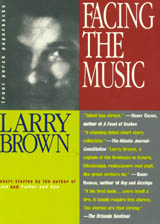 A Review of Facing the Music
A Review of Facing the Music
by Christopher L. Wade (SHS)
Facing the Music” is a short story which appears in the collection of the same name that describes vividly a day in the life of a drunken fireman. The story starts with the fireman sitting in his bedroom watching late night movies about a guy drunker than he himself is. As the night continues, the fireman starts to hate the fact that his wife is around. He wants to keep drinking so he can tune out his surroundings.
His wife has recently been in the hospital for major surgery. Now she is constantly active, either rubbing against him or working around the room or grooming herself. She considers herself fat and drinks at least a six-pack of diet coke a day. She claims her weight is the reason her husband does not pay attention to her, but it is not. He does not notice her because he cannot express his feelings about her body and what it now lacks.
He begins to remember a drunken night he spent with a luscious woman after drinking with her and some of the firehouse rookies. As he remembers this night, his wife begins to make advances toward him, trying to arouse him. He remembers the other woman removing her shirt and then thinks about how his wife now, after her surgery, only pulls up her nightgown. He remembers his honeymoon with his wife and how making love to her will never be that great again.
This is a very moving and powerful story that everyone should read. It shows how the love one has for another can cause tremendous feelings and even become hatred. Everyone should “face the music” and read this short story.
A Review of The Rich
by Christopher L. Wade (SHS)
The Rich, another short story in Facing the Music, begins in a travel agent’s office one morning as the agent prepares to greet another rich customer. Mr. Pellisher, the travel agent, straightens up the place and checks the coffee pot. Mr. Pellisher does this every time a rich customer comes in out of habit.
Mr. Pellisher thinks about being rich and wonders whether he would be invited to parties of the rich people if he had money. He muses about the courtship and sex of the rich people. He thinks he might even be able to just walk right in as a poor man without notice.
He maintains a straight face and good business attitude toward his rich customer and makes the arrangements for the trip of his rich client. After making the arrangements for the rich people, he thinks about how much he hates them even though he does so much for them. He realizes, as the rich people are leaving, that they do not care about the careful treatment he gives them and states that the rich stay rich and the poor stay poor.
This short story is good and tells about feelings you might have and the actions you might do for the admiration of someone you indeed may hate. After reading this story, you will have a different perspective on the relationship between a rich man and a poor man.
An Interview with Larry Brown by Presley Rose, 2000
What project are you working on right now?
“I am doing a piece on Robert Earl King for No Depression Magazine.”
Do you know what your next book is going to be?
“I am working on a novel and a bunch of short stories as well. I’ve got about 230 pages of a novel, and I am probably half way through with it. I have also got these short stories I’ve been working on, and I’ve got about five or six of those done. I haven’t published any short stories in a pretty good while.”
What has been your most fulfilling accomplishment as a writer?
“Probably I guess Big Bad Love being filmed was about the best thing that has happened. It has been selected for the Can Film Festival and they are going to show it on May 12th. Big Bad Love is one of three American films that has been picked.”
Do you think the reason so many writers have come from this region is because of the southern culture and people?
“I get asked that question a lot and really it is a hard question to answer. I am not really sure where it comes from. You know, a lot of people say there is something in the water. I really don’t know what the answer is.”
“To me it is just a personal thing. I wanted to write because I have always loved to read. I think that is what happens with every writer who eventually gets serious about writing and spends enough time on it. It took me about eight years to write my first book.”
“You can go to school and study with a writer but that only takes you so far. You have got to want it bad enough to hurt for it.”
An Interview with Larry Brown
by Charles Robinson (SHS) April, 2000
Many biographical sketches tell of your childhood love for books instilled in you by your mother, whom you often credit for your eventual decision to become an author. What other experiences as a child, and what circumstances do you credit for the career choices you have made?
I don’t know that any certain thing pointed me toward writing. For me it was a very gradual process of loving to read and then wondering how people learned how to write. I don’t think I can point to one single thing that turned me into a writer. It was just something I started doing when I was twenty-nine, and I gradually began to learn more about it and to be published. It just went on from there.
At what point during your life did you realize that you were to become an author?
It was sometime in the early 1980s after I’d been writing for a couple of years. I wasn’t selling anything or publishing anything but I was enjoying what I was doing. And I just kept writing. It wasn’t until I published my first book in 1988 that I thought I might be able to making a living at it.
It is a widely known fact that after high school you set out on your career as a firefighter and did not go to college. In your opinion, do you see yourself as naturally talented, or do you find that extremely-educated authors often find themselves caught in the trap of feeling that they must use highfalutin’ language to communicate the idea that they try to help the reader to visualize?
I do not see myself as naturally talented. Whatever talent I have has been developed through years of writing. I do not believe that anyone is born with a natural talent to write, I think it has to be developed. I also believe that simple language is most effective.
The best authors draw the events in their books from what they know personally. In what ways do you use your life experiences to influence your writing?
I take everything from my life, memory, experience, things that people have told me, and combine all that with my imagination to invent my stories and novels. Some characters are based on real life and some are not. I just use what I need for that particular day.
In an interview with Kay Bonetti, you say “The guys in Dirty Work are actually based on some of the Marines that I met in the early ’70’s in Philadelphia where I was stationed–guys who were in wheelchairs, who had lost their arms and legs and had made that great sacrifice too. . . The novel is all a work of fiction that comes from my being so impressed by these guys that I met.” Although you were never in Vietnam, do you feel that you could have better created your characters and related to their experiences if you had been in a battle front situation?
Who knows? I tried to write a book that was more about the aftermath of the war and the damage that was inflicted on two soldiers more than the actual war itself. I wanted to show not so much what happened to them then, but what is happening to them now. I knew everything I needed to know about the weapons from my training, and I’d talked to enough marines who were in combat to find out what it was like over there. That’s all you need. You just invent the rest.
Also in the Bonetti interview, you say that when you went into Norman Clark’s store, if no one else was around, he would sit down and tell you stories and talk to you. Do you feel we as Southerners have lost that hometown “folksy” feel to our way of life?
To me, in a large part a great deal of the South has been homogenized like the rest of the United States. I still live out in the country and I don’t feel like our lifestyle is that radically different from the rest of this area. We still raise a garden, we still have cows, we still go hunting and fishing and I still feel deeply rooted in the country. That’s just for me personally. My home town, however, has changed a great deal. There are many more people here now and there is less farming but we still like to sit on the porch.
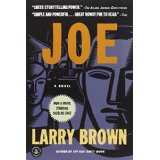 In your book Joe, Fay is a minor character that walks out of the story. While you were writing Joe, did you know that you would eventually write a book about this intriguing character?
In your book Joe, Fay is a minor character that walks out of the story. While you were writing Joe, did you know that you would eventually write a book about this intriguing character?
No
In previous criticism, writers have said that many of your female characters seem to be flat and do not have the character that your male characters had. What obstacles did you have to overcome writing about a female in Fay?
The writing was more difficult because I’m not a woman. I had to rely on women to find out some of the things I needed to know. But writing fiction is always about getting into someone’s head, wearing their clothes, walking in their shoes and you have to live in this person’s head for a couple of years sometimes. But that’s what is necessary to write a novel.
In your opinion, what do you think is your best book, and do your think the public feels the same way?
That’s hard to say. Some people point to Dirty Work, some to Joe, some to Big Bad Love, and what I’ve been hearing lately is that Fay is my best book. My personal favorite is probably Dirty Work, but I don’t know what the public thinks
Related Websites
- Dwight Garner says On Fire Makes Bad Habits Sound Very Sweet” (June 1, 2017 NYT)
- Larry Brown: A Writer’s Life by Jean W. Cash
- Roger Boylan of Boston Review discusses Fay by Larry Brown.
- Read reviews of Brown’s last novel The Rabbit Factory on Amazon.com.
- Editorial reviews for Father and Son are here.
- New York Times publishes obituary and highlights of Brown’s career.
- Ole Miss Writers Page on Larry Brown
Bibliography
- Abbott, Dorothy, ed. Mississippi Writers: An Anthology. Jackson: University Press of Mississippi, 1991. 17-28, 499.
- Bonetti, Kay. “An Interview with Larry Brown.” [online] available: http:\\www.missourireview.org/interviews/brown.html, April 14, 2000.
- Brown, Larry. E-mail Interview. 2 May, 2000.
- Brown, Larry. Facing The Music. Chapel Hill, NC: Algonquin Books of Chapel Hill, 1988.
- Brown Larry. Fay. Chapel Hill, North Carolina: Algonquin Books of Chapel Hill, 2000.
- Franklin, Tom. “Fay.” The Star Tribune Online. [online] available:
http:\\www2.startribune.com/cgi-bin/stOnLine/article?thisSlug=fay02, April 14, 2000. - “Larry Brown: Biography.” [online] available: http:\\www.algonquin.com/larrybrown/larry1.html, April 14, 2000.
- Parsons, Alexander. “Waiting in the Gloam: An Interview with Author Larry Brown.” Uno Mas Magazine. [online] available: http:\\www.unomas.com/features/Larrybrown.html, April 14, 2000.
- Scube, Michael. “Straight from the Heart.” [online] available:
http:\\www.accessatlanta.com/global/local/yall/culture/quill/brownl/brown2.html, April 17, 2000. - Trotsky, Susan M. ed. “Brown, (William) Larry 1951-” Contemporary Authors. vol. 130. Detroit: Gale Research Inc., 1990.180 vols. 51.
- Trotsky, Susan M. ed “Brown, (William) Larry.” Contemporary Authors. Vol. 134. Detroit: Gale Research Inc., 1992. 180 vols. 88-91.
- Vitshum, Virginia. “Fay.” [Online] available: http:\\www.salon.com/books/review/2000/04/brown/index.html, April 14, 2000.

